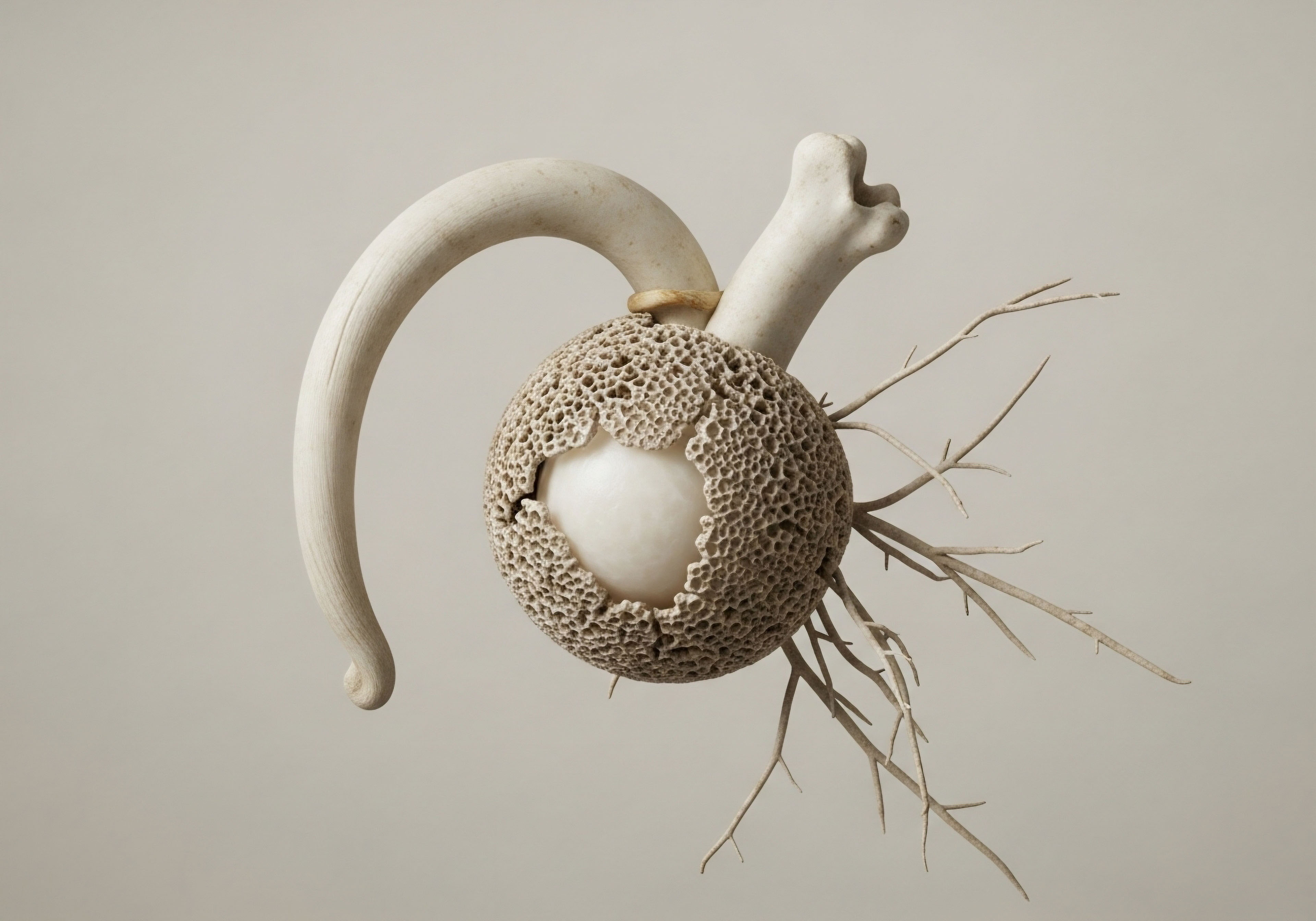

Fundamentals
Have you ever found yourself feeling a subtle shift in your body’s rhythm, a quiet whisper of change that gradually grows louder? Perhaps it manifests as a persistent fatigue, a diminished drive, or a sense that your usual vitality has somehow dimmed.
These experiences, often dismissed as simply “getting older” or “stress,” are frequently the body’s intelligent signals, pointing to deeper systemic adjustments. Your internal messaging system, the endocrine network, orchestrates countless biological processes, and when its delicate balance wavers, the repercussions can ripple through your entire being. Understanding these signals marks the initial step in reclaiming your well-being.
Many individuals seek support for these shifts, exploring avenues like hormonal optimization protocols to restore a sense of equilibrium. A common question arises regarding the long-term effects of these interventions on vital organs, particularly the kidneys. The kidneys, often seen primarily as filters, are deeply integrated into your hormonal landscape. They are not merely passive organs; they actively participate in maintaining your body’s internal stability, processing hormones, and responding to their directives.
The body’s internal messaging system, the endocrine network, orchestrates countless biological processes.
Consider the intricate relationship between your endocrine system and renal function. Hormones, these powerful chemical messengers, travel through your bloodstream, influencing nearly every cell and organ. The kidneys, in turn, play a dual role ∞ they are both recipients of hormonal signals and producers of their own regulatory substances.
This reciprocal communication ensures the body operates as a cohesive unit. When hormonal therapy is introduced, it aims to recalibrate this communication, and understanding its systemic reach, especially to the kidneys, becomes paramount.

The Body’s Internal Regulators
Your body maintains a remarkable internal environment through constant regulation. This involves a complex interplay of various systems, with the endocrine network at its core. Glands like the thyroid, adrenals, and gonads secrete hormones that influence everything from your energy levels and mood to your metabolism and fluid balance. When these hormonal levels become suboptimal, a cascade of symptoms can arise, prompting individuals to consider interventions designed to restore balance.
The kidneys, two bean-shaped organs nestled beneath your rib cage, perform critical functions far beyond simple waste removal. They filter approximately 180 liters of blood daily, removing toxins and excess fluid to produce urine. Beyond this filtration, they regulate blood pressure, control red blood cell production, and activate vitamin D, a substance essential for bone health and immune function. This active involvement in systemic regulation highlights their sensitivity to changes in the body’s hormonal milieu.

Connecting Hormones and Kidney Health
The connection between hormonal balance and kidney health is more direct than many realize. Hormones influence renal blood flow, the rate at which blood is filtered, and the reabsorption of essential nutrients and water. For instance, hormones like aldosterone, produced by the adrenal glands, directly influence sodium and potassium balance in the kidneys, thereby affecting blood pressure. Disruptions in these hormonal signals can place additional strain on renal structures over time.
When considering hormonal therapy, whether it involves optimizing testosterone levels or balancing female endocrine systems, it is natural to question the long-term impact on such vital organs. The goal of these therapies is to restore physiological levels, aiming for a state of optimal function rather than merely addressing symptoms in isolation. A comprehensive approach acknowledges the interconnectedness of all bodily systems, ensuring that interventions support overall well-being.


Intermediate
Moving beyond the foundational understanding of hormonal influence, we now consider the specific clinical protocols often employed in personalized wellness, and how these interventions interact with renal physiology. Hormonal optimization protocols, such as Testosterone Replacement Therapy (TRT) for men and women, and various Growth Hormone Peptide Therapies, are designed to recalibrate the body’s internal messaging system. The question of their long-term effects on renal function requires a closer examination of the mechanisms involved.
The kidneys are not merely passive filters; they are dynamic organs with their own hormonal receptors and metabolic pathways. They respond to circulating hormones and also produce several substances that influence systemic endocrine balance. This bidirectional communication means that introducing exogenous hormones or peptides can influence renal function, either beneficially or in ways that require careful monitoring.

Testosterone Optimization and Renal Function
For men experiencing symptoms of low testosterone, often termed hypogonadism, TRT is a common intervention. Protocols typically involve weekly intramuscular injections of Testosterone Cypionate, often complemented by medications like Gonadorelin to maintain natural testosterone production and fertility, and Anastrozole to manage estrogen conversion. Research indicates that long-term testosterone optimization in hypogonadal men can have a favorable impact on renal health.
Long-term testosterone optimization in hypogonadal men can have a favorable impact on renal health.
Studies have shown that men receiving long-term testosterone undecanoate therapy experienced improvements in markers of renal function. These improvements included a decrease in serum urea, uric acid, and creatinine levels, alongside an increase in glomerular filtration rate (GFR). GFR is a key indicator of kidney health, reflecting how efficiently the kidneys are filtering waste from the blood.
One large population study even suggested that testosterone optimization was associated with a delayed progression of chronic kidney disease to end-stage renal disease and prolonged survival.
The mechanisms behind these observed benefits are thought to be multifaceted. Testosterone may exert direct effects on renal cells, influencing their metabolic activity and reducing inflammatory processes. Additionally, testosterone optimization often leads to improvements in metabolic syndrome components, such as reduced obesity, better blood pressure control, and improved lipid profiles. Since these metabolic factors are significant contributors to kidney disease progression, their improvement indirectly supports renal health.

Female Hormonal Balance and Kidney Health
For women, hormonal balance protocols address symptoms related to pre-menopausal, peri-menopausal, and post-menopausal transitions. These protocols may involve low-dose Testosterone Cypionate via subcutaneous injection, Progesterone, or Pellet Therapy, sometimes with Anastrozole. The relationship between female hormonal therapy and renal function presents a more complex picture, with some studies indicating beneficial effects and others suggesting potential concerns depending on the specific hormones, dosages, and duration of use.
Endogenous estrogens are generally considered protective for kidney health, influencing renal blood flow and inflammation. However, the effects of exogenous estrogen, particularly in long-term oral formulations, have yielded mixed results. Some research suggests that hormone replacement therapy may protect kidney health, showing a lower prevalence of markers like microalbuminuria (a sign of early kidney damage) and improved GFR in some cohorts.
Conversely, other studies, including animal models and observations in elderly postmenopausal women, have indicated that long-term estrogen treatment might be associated with an accelerated decline in kidney function or increased risk of kidney damage.
This variability underscores the importance of personalized assessment. The type of hormone, the route of administration (oral versus transdermal or subcutaneous), the dosage, and the individual’s underlying health status all play a role in how hormonal therapy interacts with renal function. A careful clinical evaluation, including monitoring of renal markers, is essential to tailor protocols that support both symptomatic relief and long-term organ health.

Peptide Therapies and Renal Considerations
Beyond traditional hormonal optimization, peptide therapies are gaining recognition for their targeted effects on various physiological processes, including anti-aging, muscle gain, fat loss, and tissue repair. Key peptides like Sermorelin, Ipamorelin / CJC-1295, Tesamorelin, Hexarelin, and MK-677 primarily influence growth hormone secretion. Others, such as PT-141, address sexual health, and Pentadeca Arginate (PDA) supports tissue repair and inflammation modulation.
The interaction of these peptides with renal function is an evolving area of study. Growth hormone and its mediator, insulin-like growth factor-1 (IGF-1), have known effects on the kidneys, influencing glomerular hemodynamics and tubular reabsorption. While these effects are often physiological, particularly in conditions of deficiency, the long-term impact of exogenous peptide administration on renal health requires careful consideration.
The kidneys are responsible for metabolizing and eliminating many peptides, and their function can influence peptide half-lives and circulating levels.
For example, growth hormone and IGF-1 receptors are present in various kidney cells, regulating processes like renal gluconeogenesis and vitamin D activation. While targeted peptide use aims to restore optimal physiological signaling, any intervention that alters systemic growth factor levels warrants monitoring of renal markers. The clinical translator’s role involves weighing the potential benefits against any theoretical risks, always prioritizing patient safety and long-term well-being.
The clinical translator’s role involves weighing potential benefits against theoretical risks, prioritizing patient safety.
Here is a comparison of general considerations for different hormonal and peptide therapies concerning renal function:
| Therapy Type | Primary Hormones/Peptides | General Renal Impact Considerations |
|---|---|---|
| Male TRT | Testosterone Cypionate, Gonadorelin, Anastrozole | Often associated with improved GFR, reduced creatinine/urea/uric acid in hypogonadal men. Potential for indirect benefits via metabolic health improvements. |
| Female HRT | Testosterone Cypionate, Progesterone, Estrogen (various forms) | Mixed findings; endogenous estrogen protective, but exogenous estrogen effects vary by type, dose, and duration. Some studies show benefit, others suggest potential decline with long-term oral use. |
| Growth Hormone Peptides | Sermorelin, Ipamorelin/CJC-1295, Tesamorelin, Hexarelin, MK-677 | Influence growth hormone/IGF-1 axis, which impacts renal hemodynamics and metabolism. Generally considered safe at physiological doses, but long-term monitoring is prudent. |
| Other Targeted Peptides | PT-141, Pentadeca Arginate (PDA) | Less direct renal impact documented, but systemic effects on inflammation and tissue repair could indirectly influence renal health. Kidneys metabolize and excrete peptides. |


Academic
The intricate dance between the endocrine system and renal function represents a sophisticated biological orchestration. To truly comprehend the long-term effects of hormonal therapy on renal health, one must delve into the molecular and cellular mechanisms that govern this interplay. The kidneys are not merely passive recipients of hormonal signals; they are active participants in hormonal metabolism, excretion, and even production, making them highly sensitive to systemic endocrine shifts.
The concept of a “systems-biology” perspective is paramount here. Hormones do not operate in isolation; they form complex feedback loops and interact across multiple axes, such as the Hypothalamic-Pituitary-Gonadal (HPG) axis, the Renin-Angiotensin-Aldosterone System (RAAS), and the Growth Hormone-Insulin-like Growth Factor 1 (GH-IGF-1) axis. Understanding how therapeutic interventions influence these interconnected pathways provides a deeper appreciation of their systemic impact on renal function.

The Kidney as an Endocrine Organ and Target
The kidneys possess a unique dual identity within the endocrine system. They function as endocrine glands themselves, producing vital hormones such as erythropoietin (EPO), which stimulates red blood cell production, and 1,25-dihydroxyvitamin D3 (calcitriol), the active form of vitamin D essential for calcium and phosphate homeostasis. Furthermore, the kidneys are central to the RAAS, producing renin, an enzyme that initiates a cascade leading to the production of angiotensin II and aldosterone, both critical regulators of blood pressure and fluid balance.
Simultaneously, renal cells express receptors for a wide array of hormones, making the kidneys a primary target organ. These include receptors for sex steroids (androgens, estrogens), thyroid hormones, growth hormone, insulin, and various natriuretic peptides. The binding of these hormones to their specific receptors on glomerular cells (e.g.
podocytes, mesangial cells) and tubular cells modulates renal blood flow, filtration rates, and reabsorption processes. Alterations in circulating hormone levels, whether due to endogenous imbalance or exogenous therapy, can therefore directly influence renal hemodynamics and cellular function.

How Does Hormonal Therapy Influence Renal Hemodynamics?
The long-term effects of hormonal therapy on renal function are often mediated through changes in intrarenal hemodynamics. For instance, testosterone has been shown to influence the tone of afferent and efferent arterioles within the kidney, which are crucial for regulating glomerular filtration pressure.
While some studies suggest a beneficial effect of testosterone on GFR in hypogonadal men, possibly by improving renal perfusion and reducing uric acid levels, other observations, particularly in specific patient populations or with supraphysiological doses, have indicated potential for altered renal blood flow and even acute kidney injury.
The precise mechanism by which testosterone influences renal hemodynamics is complex. It may involve direct effects on vascular smooth muscle cells in renal arterioles, influencing their contractility. Additionally, testosterone can affect the RAAS, a system intimately involved in blood pressure regulation and renal perfusion. A balanced RAAS is essential for maintaining kidney health, and any therapeutic intervention that modulates this system requires careful consideration of its long-term renal implications.
Hormones do not operate in isolation; they form complex feedback loops and interact across multiple axes.
Estrogens also play a significant role in renal hemodynamics. Endogenous estrogens are generally considered vasodilatory, promoting renal blood flow and potentially offering protective effects against hypertension-induced kidney damage. However, the impact of exogenous estrogen therapy, particularly oral formulations, can be variable.
Oral estrogens undergo first-pass metabolism in the liver, which can influence the production of various vasoactive substances, potentially affecting renal perfusion and coagulation factors. This differential processing may contribute to the conflicting findings regarding female hormone therapy and renal outcomes.

Metabolic Interconnections and Renal Health
Beyond direct hemodynamic effects, hormonal therapies influence renal function through their broader impact on metabolic health. Conditions like insulin resistance, obesity, and dyslipidemia are significant risk factors for chronic kidney disease. Hormonal imbalances, such as hypogonadism in men or certain patterns of hormonal decline in women, are often associated with these metabolic derangements.
Testosterone optimization in men, for example, has been shown to improve insulin sensitivity, reduce visceral adiposity, and ameliorate dyslipidemia. These systemic metabolic improvements can indirectly alleviate the burden on the kidneys, reducing inflammation and oxidative stress that contribute to renal injury. The reduction in uric acid levels observed with TRT is also noteworthy, as elevated uric acid is an independent risk factor for kidney disease progression.
Similarly, the GH-IGF-1 axis has profound metabolic effects. Growth hormone and IGF-1 influence glucose metabolism, protein synthesis, and lipid breakdown. While these peptides are essential for normal physiological function, their dysregulation can impact renal health. For instance, in conditions like acromegaly (excessive GH), renal hypertrophy and hyperfiltration can occur, potentially leading to long-term damage.
Conversely, GH deficiency can be associated with metabolic abnormalities that indirectly affect kidney function. Targeted peptide therapies aim to restore optimal GH signaling, which, when carefully managed, can support metabolic health and, by extension, renal well-being.

Monitoring Renal Markers in Hormonal Therapy
A rigorous approach to personalized wellness protocols necessitates continuous monitoring of renal markers. This includes routine assessment of serum creatinine, blood urea nitrogen (BUN), and calculation of estimated GFR (eGFR). For a more comprehensive evaluation, particularly in individuals with pre-existing renal concerns, measurement of urinary albumin-to-creatinine ratio (UACR) can detect early signs of glomerular damage.
The interpretation of these markers in the context of hormonal therapy requires clinical acumen. For example, testosterone can influence muscle mass, which in turn affects creatinine levels. A slight increase in serum creatinine in a man on TRT might reflect increased muscle mass rather than a decline in kidney function, necessitating a careful assessment of eGFR and other markers.
Here is a table summarizing key renal markers and their significance:
| Renal Marker | Description | Significance in Hormonal Therapy Context |
|---|---|---|
| Serum Creatinine | Waste product from muscle metabolism, filtered by kidneys. | Elevated levels suggest reduced kidney filtration. Can be influenced by muscle mass (e.g. with testosterone therapy). |
| Blood Urea Nitrogen (BUN) | Waste product from protein breakdown, filtered by kidneys. | Elevated levels indicate impaired kidney function or dehydration. Can be affected by protein intake and catabolism. |
| Glomerular Filtration Rate (GFR) | Calculated rate at which kidneys filter blood. | The best overall measure of kidney function. A decline indicates worsening renal health. |
| Urinary Albumin-to-Creatinine Ratio (UACR) | Measures albumin (protein) in urine relative to creatinine. | Elevated levels indicate proteinuria, an early sign of kidney damage, particularly glomerular injury. |
The ongoing dialogue between the endocrine system and the kidneys is a testament to the body’s remarkable self-regulatory capacity. Hormonal therapies, when applied with precision and continuous monitoring, aim to support this inherent intelligence, guiding the body back towards a state of optimal function and long-term vitality. The journey towards understanding your own biological systems is a powerful one, enabling you to make informed choices for your health.

References
- Yassin, A. A. et al. “Long-Term Testosterone Treatment Improves Fatty Liver and Kidney Function with Safe Outcomes on Cardio-, Metabolic and Prostate Health in Men with Hypogonadism. Prospective Controlled Studies.” Journal of Clinical Endocrinology & Metabolism, vol. 105, no. 12, 2020, pp. 1553-1563.
- Yassin, A. A. et al. “The Impact of Long-Term Testosterone Therapy (TTh) in Renal Function (RF) Among Hypogonadal Men ∞ An Observational Cohort Study.” Andrology, vol. 8, no. 6, 2020, pp. 1599-1606.
- Silbiger, S. R. “The Effects of Hormone Replacement Therapy on Renal Function.” Nature Clinical Practice Nephrology, vol. 5, no. 1, 2009, pp. 6-7.
- Yassin, A. A. et al. “Long-term Testosterone Therapy Improves Renal Function in Men with Hypogonadism ∞ A Real-life Prospective Controlled Registry.” JSciMed Central, vol. 3, no. 1, 2020, pp. 1-10.
- Silbiger, S. R. “Is Testosterone Detrimental to Renal Function?” Clinical Kidney Journal, vol. 7, no. 2, 2014, pp. 127-129.
- Kattah, A. et al. “Hormone Replacement Therapy May Benefit the Kidneys.” ASN Kidney Week 2015, Abstract, 2015.
- Lindsey, S. H. et al. “Long-term Estrogen Treatment After Menopause May Damage Kidneys, Tulane Study Says.” American Journal of Physiology ∞ Renal Physiology, 2016.
- Boron, W. F. and E. L. Boulpaep. Medical Physiology. 3rd ed. Elsevier, 2017.
- Guyton, A. C. and J. E. Hall. Textbook of Medical Physiology. 13th ed. Elsevier, 2016.
- The Endocrine Society. Clinical Practice Guidelines. Various publications.

Reflection
As you consider the intricate connections between your hormonal landscape and the vitality of your kidneys, a profound realization may settle within you ∞ your body is a system of remarkable interconnectedness. The information presented here serves as a guide, a beacon illuminating the complex biological pathways that influence your well-being. It invites you to move beyond a fragmented view of health, encouraging a holistic perspective where every system influences another.
Your personal health journey is unique, a testament to your individual biology and lived experiences. The knowledge gained from exploring these topics is not an endpoint, but rather a powerful beginning. It empowers you to engage in more informed conversations with your healthcare providers, to ask precise questions, and to advocate for protocols that truly align with your body’s specific needs.
This deeper understanding is the foundation upon which you can build a personalized path towards reclaiming your vitality and functioning without compromise.

What Is Your Body Communicating?
Take a moment to listen to the subtle signals your body sends. Are there persistent symptoms that hint at an underlying imbalance? Perhaps a lingering fatigue, a shift in mood, or a change in physical performance. These are not merely isolated incidents; they are often messages from your endocrine system, inviting a closer look.

How Can Personalized Protocols Support Your Well-Being?
With a deeper understanding of hormonal health and its systemic impact, you can begin to consider how personalized protocols might support your unique physiological requirements. This involves a careful assessment of your current hormonal status, metabolic markers, and overall health goals. The aim is always to restore balance and optimize function, allowing your body to operate at its inherent best.



